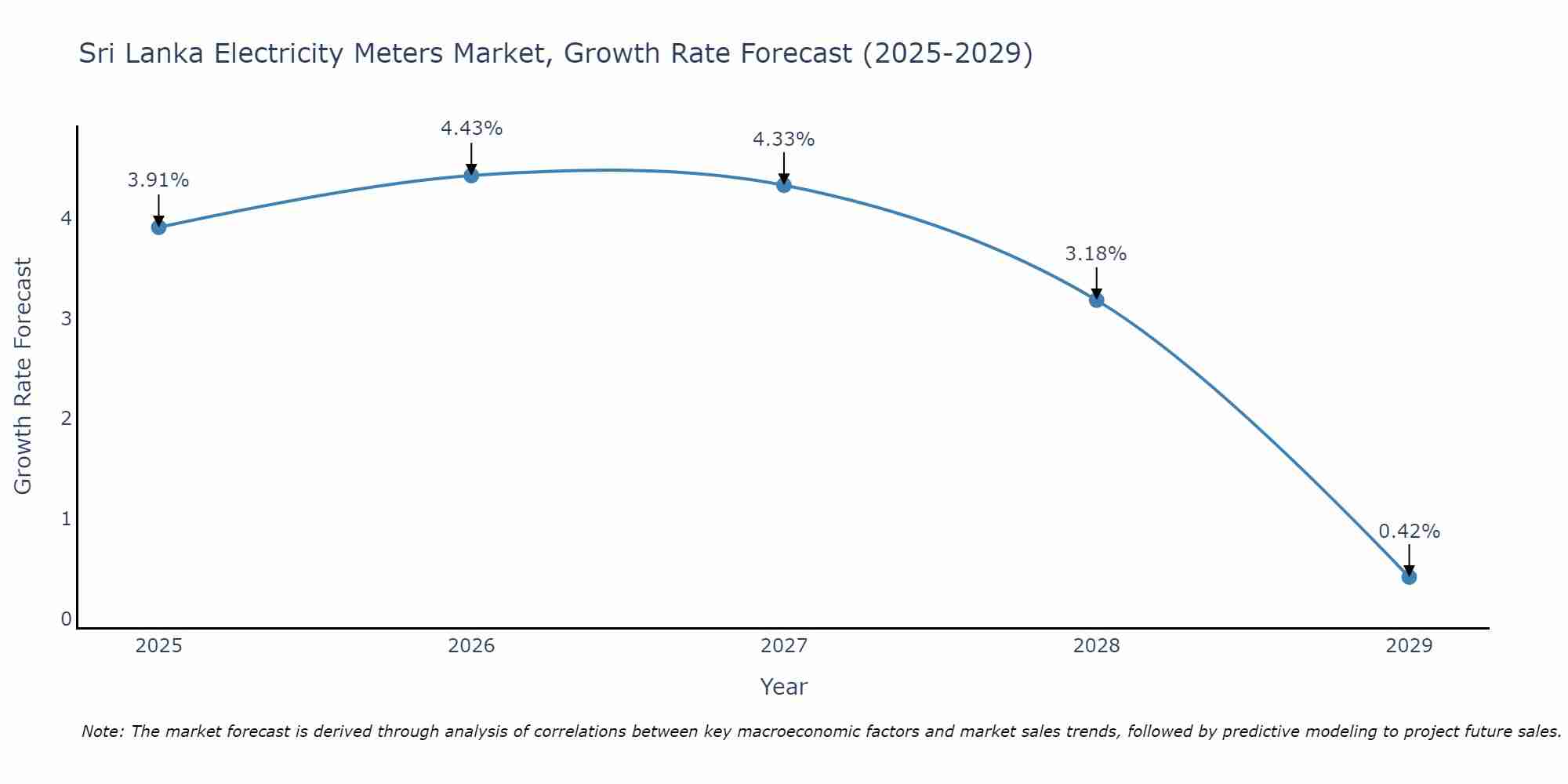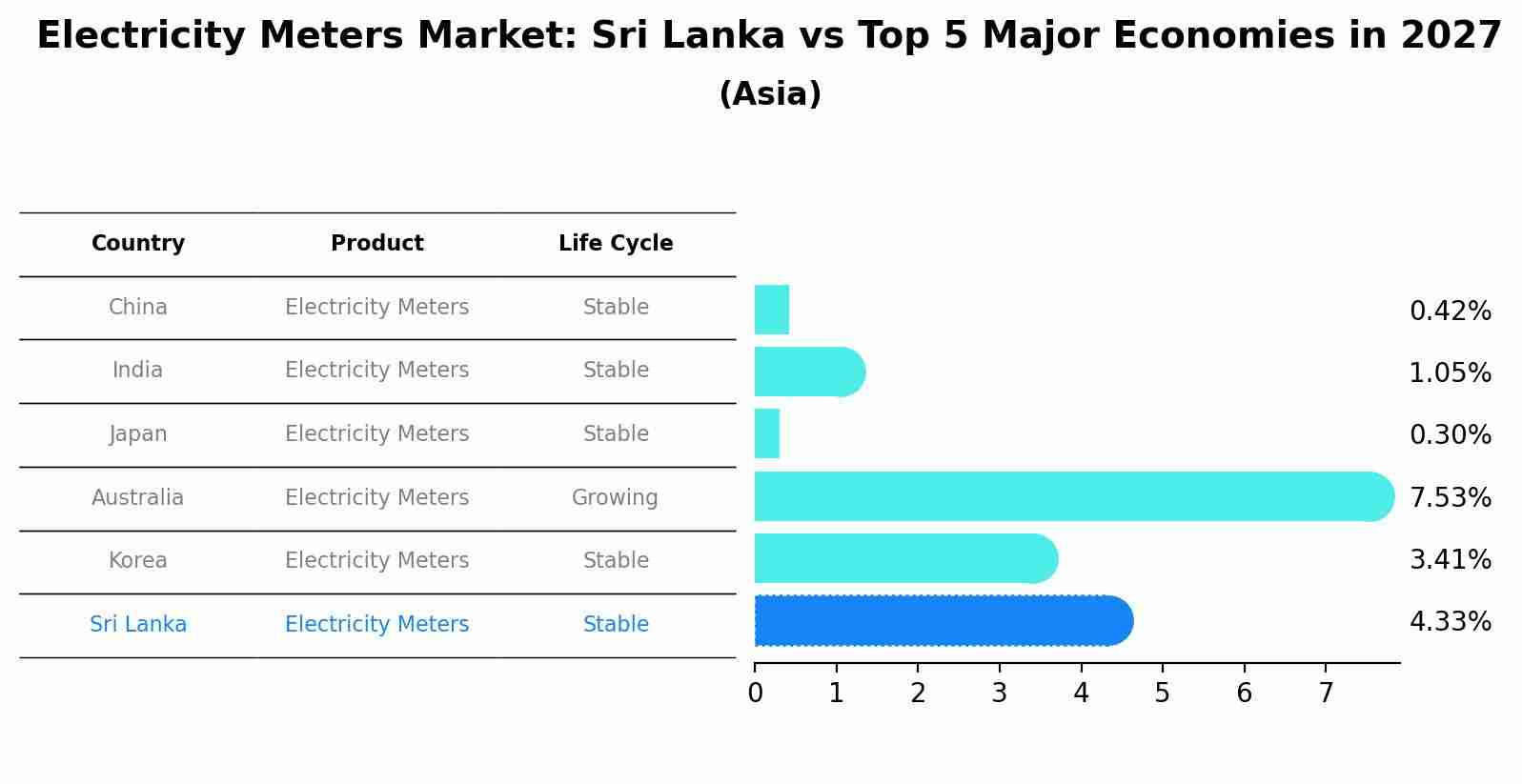Sri Lanka Electricity Meters Market Outlook | COVID-19 IMPACT, Analysis, Value, Growth, Trends, Industry, Size, Forecast, Revenue, Share & Companies
| Product Code: ETC432927 | Publication Date: Oct 2022 | Updated Date: Jul 2025 | Product Type: Market Research Report | |
| Publisher: 6Wresearch | Author: Sumit Sagar | No. of Pages: 75 | No. of Figures: 35 | No. of Tables: 20 |
Sri Lanka Electricity Meters Market Size Growth Rate
The Sri Lanka Electricity Meters Market is projected to witness mixed growth rate patterns during 2025 to 2029. Growth accelerates to 4.43% in 2026, following an initial rate of 3.91%, before easing to 0.42% at the end of the period.

Electricity Meters Market: Sri Lanka vs Top 5 Major Economies in 2027 (Asia)
By 2027, the Electricity Meters market in Sri Lanka is anticipated to reach a growth rate of 4.33%, as part of an increasingly competitive Asia region, where China remains at the forefront, supported by India, Japan, Australia and South Korea, driving innovations and market adoption across sectors.

Sri Lanka Electricity Meters Market Synopsis
The Sri Lanka Electricity Meters Market is experiencing steady growth due to increasing urbanization and industrialization, as well as government initiatives to improve access to electricity across rural areas. The market is primarily driven by the need for accurate metering and billing systems to ensure efficient energy consumption and revenue collection. Smart meters are gaining popularity in the region, as they offer advanced features such as real-time data monitoring and remote connectivity. Key players in the Sri Lanka Electricity Meters Market include Landis+Gyr, Elster Group, and General Electric, among others. Factors such as rising electricity demand, renewable energy integration, and regulatory reforms are expected to further propel the market growth in the coming years.
Sri Lanka Electricity Meters Market Trends
The Sri Lanka Electricity Meters Market is experiencing a shift towards smart meters, driven by the government`s focus on improving energy efficiency and reducing electricity theft. Smart meters offer benefits such as real-time monitoring, remote reading capabilities, and two-way communication with utility providers. This trend is expected to continue as utility companies seek to modernize their infrastructure and improve operational efficiency. Additionally, there is a growing demand for prepaid electricity meters as they provide consumers with more control over their energy usage and billing. The market is also witnessing an increasing adoption of advanced metering infrastructure (AMI) systems to enable better grid management and integration of renewable energy sources. Overall, the Sri Lanka Electricity Meters Market is evolving towards smarter and more efficient solutions to meet the country`s energy needs.
Sri Lanka Electricity Meters Market Challenges
In the Sri Lanka Electricity Meters Market, some key challenges are the prevalence of electricity theft and tampering, which not only leads to revenue losses for utility companies but also affects the overall reliability of the electricity supply. Another challenge is the need for upgrading outdated metering infrastructure to support smart grid technologies and enable more efficient monitoring and management of electricity usage. Additionally, issues related to meter accuracy, data privacy, and cybersecurity also pose challenges in the market. Addressing these challenges requires investment in advanced metering solutions, regulatory reforms to combat electricity theft, and increased awareness among consumers about the importance of using electricity efficiently.
Sri Lanka Electricity Meters Market Investment Opportunities
The Sri Lanka Electricity Meters Market presents several investment opportunities for growth and innovation. With the increasing demand for electricity and the government`s initiatives to modernize the energy sector, there is a growing need for advanced and smart meters. Investors can explore opportunities in manufacturing and supplying smart meters, which enable efficient energy management and real-time monitoring. Additionally, there is potential for investment in renewable energy integration with smart meters to support the country`s sustainability goals. Collaborating with local utilities and government agencies for metering infrastructure projects can also be a lucrative investment avenue. Overall, the Sri Lanka Electricity Meters Market offers promising prospects for investors looking to capitalize on the evolving energy landscape in the country.
Jordan Agar Market Government Policies
The Sri Lankan government has implemented various policies related to the electricity meters market to promote energy efficiency and transparency. One key policy is the mandatory installation of smart meters for all electricity consumers, aiming to reduce energy wastage and improve billing accuracy. The government also encourages the use of renewable energy sources by offering incentives for households and businesses to adopt solar power and other sustainable alternatives. Additionally, regulations are in place to ensure fair competition in the electricity meters market, preventing monopolies and promoting innovation. Overall, these policies reflect the government`s commitment to modernizing the energy sector, enhancing consumer awareness, and promoting sustainable development in Sri Lanka.
Sri Lanka Electricity Meters Market Future Outlook
The Sri Lanka Electricity Meters Market is expected to witness steady growth in the coming years, driven by increasing urbanization, industrialization, and government initiatives to improve energy efficiency and metering infrastructure. The market is likely to be influenced by the growing demand for smart meters, which offer advanced features such as real-time data monitoring and remote access. Additionally, the rising adoption of renewable energy sources like solar power is expected to drive the need for more sophisticated metering solutions. However, challenges such as high initial costs and regulatory constraints may impact the market growth. Overall, technological advancements and increasing awareness about energy conservation are anticipated to fuel the demand for electricity meters in Sri Lanka in the foreseeable future.
Key Highlights of the Report:
- Sri Lanka Electricity Meters Market Outlook
- Market Size of Sri Lanka Electricity Meters Market, 2021
- Forecast of Sri Lanka Electricity Meters Market, 2031
- Historical Data and Forecast of Sri Lanka Electricity Meters Revenues & Volume for the Period 2018 - 2031
- Sri Lanka Electricity Meters Market Trend Evolution
- Sri Lanka Electricity Meters Market Drivers and Challenges
- Sri Lanka Electricity Meters Price Trends
- Sri Lanka Electricity Meters Porter's Five Forces
- Sri Lanka Electricity Meters Industry Life Cycle
- Historical Data and Forecast of Sri Lanka Electricity Meters Market Revenues & Volume By Type for the Period 2018 - 2031
- Historical Data and Forecast of Sri Lanka Electricity Meters Market Revenues & Volume By Single Phase for the Period 2018 - 2031
- Historical Data and Forecast of Sri Lanka Electricity Meters Market Revenues & Volume By Three Phase for the Period 2018 - 2031
- Historical Data and Forecast of Sri Lanka Electricity Meters Market Revenues & Volume By Analog for the Period 2018 - 2031
- Historical Data and Forecast of Sri Lanka Electricity Meters Market Revenues & Volume By Smart for the Period 2018 - 2031
- Historical Data and Forecast of Sri Lanka Electricity Meters Market Revenues & Volume By Application for the Period 2018 - 2031
- Historical Data and Forecast of Sri Lanka Electricity Meters Market Revenues & Volume By Residential for the Period 2018 - 2031
- Historical Data and Forecast of Sri Lanka Electricity Meters Market Revenues & Volume By Commercial for the Period 2018 - 2031
- Historical Data and Forecast of Sri Lanka Electricity Meters Market Revenues & Volume By Industrial for the Period 2018 - 2031
- Historical Data and Forecast of Sri Lanka Electricity Meters Market Revenues & Volume By Others for the Period 2018 - 2031
- Sri Lanka Electricity Meters Import Export Trade Statistics
- Market Opportunity Assessment By Type
- Market Opportunity Assessment By Application
- Sri Lanka Electricity Meters Top Companies Market Share
- Sri Lanka Electricity Meters Competitive Benchmarking By Technical and Operational Parameters
- Sri Lanka Electricity Meters Company Profiles
- Sri Lanka Electricity Meters Key Strategic Recommendations
Frequently Asked Questions About the Market Study (FAQs):
- Single User License$ 1,995
- Department License$ 2,400
- Site License$ 3,120
- Global License$ 3,795
Search
Related Reports
- Vietnam System Integrator Market (2025-2031) | Size, Companies, Analysis, Industry, Value, Forecast, Growth, Trends, Revenue & Share
- ASEAN and Thailand Brain Health Supplements Market (2025-2031) | Strategy, Consumer Insights, Analysis, Investment Trends, Opportunities, Growth, Size, Share, Industry, Revenue, Segments, Value, Segmentation, Supply, Forecast, Restraints, Outlook, Competition, Drivers, Trends, Demand, Pricing Analysis, Competitive, Strategic Insights, Companies, Challenges
- ASEAN Bearings Market (2025-2031) | Strategy, Consumer Insights, Analysis, Investment Trends, Opportunities, Growth, Size, Share, Industry, Revenue, Segments, Value, Segmentation, Supply, Forecast, Restraints, Outlook, Competition, Drivers, Trends, Demand, Pricing Analysis, Competitive, Strategic Insights, Companies, Challenges
- Europe Flooring Market (2025-2031) | Outlook, Share, Industry, Trends, Forecast, Companies, Revenue, Size, Analysis, Growth & Value
- Saudi Arabia Manlift Market (2025-2031) | Outlook, Size, Growth, Trends, Companies, Industry, Revenue, Value, Share, Forecast & Analysis
- Uganda Excavator, Crane, and Wheel Loaders Market (2025-2031) | Strategy, Consumer Insights, Analysis, Investment Trends, Opportunities, Growth, Size, Share, Industry, Revenue, Segments, Value, Segmentation, Supply, Forecast, Restraints, Outlook, Competition, Drivers, Trends, Demand, Pricing Analysis, Competitive, Strategic Insights, Companies, Challenges
- Rwanda Excavator, Crane, and Wheel Loaders Market (2025-2031) | Strategy, Consumer Insights, Analysis, Investment Trends, Opportunities, Growth, Size, Share, Industry, Revenue, Segments, Value, Segmentation, Supply, Forecast, Restraints, Outlook, Competition, Drivers, Trends, Demand, Pricing Analysis, Competitive, Strategic Insights, Companies, Challenges
- Kenya Excavator, Crane, and Wheel Loaders Market (2025-2031) | Strategy, Consumer Insights, Analysis, Investment Trends, Opportunities, Growth, Size, Share, Industry, Revenue, Segments, Value, Segmentation, Supply, Forecast, Restraints, Outlook, Competition, Drivers, Trends, Demand, Pricing Analysis, Competitive, Strategic Insights, Companies, Challenges
- Angola Excavator, Crane, and Wheel Loaders Market (2025-2031) | Strategy, Consumer Insights, Analysis, Investment Trends, Opportunities, Growth, Size, Share, Industry, Revenue, Segments, Value, Segmentation, Supply, Forecast, Restraints, Outlook, Competition, Drivers, Trends, Demand, Pricing Analysis, Competitive, Strategic Insights, Companies, Challenges
- Israel Intelligent Transport System Market (2025-2031) | Strategy, Consumer Insights, Analysis, Investment Trends, Opportunities, Growth, Size, Share, Industry, Revenue, Segments, Value, Segmentation, Supply, Forecast, Restraints, Outlook, Competition, Drivers, Trends, Demand, Pricing Analysis, Competitive, Strategic Insights, Companies, Challenges
Industry Events and Analyst Meet
Our Clients
Whitepaper
- Middle East & Africa Commercial Security Market Click here to view more.
- Middle East & Africa Fire Safety Systems & Equipment Market Click here to view more.
- GCC Drone Market Click here to view more.
- Middle East Lighting Fixture Market Click here to view more.
- GCC Physical & Perimeter Security Market Click here to view more.
6WResearch In News
- Doha a strategic location for EV manufacturing hub: IPA Qatar
- Demand for luxury TVs surging in the GCC, says Samsung
- Empowering Growth: The Thriving Journey of Bangladesh’s Cable Industry
- Demand for luxury TVs surging in the GCC, says Samsung
- Video call with a traditional healer? Once unthinkable, it’s now common in South Africa
- Intelligent Buildings To Smooth GCC’s Path To Net Zero













